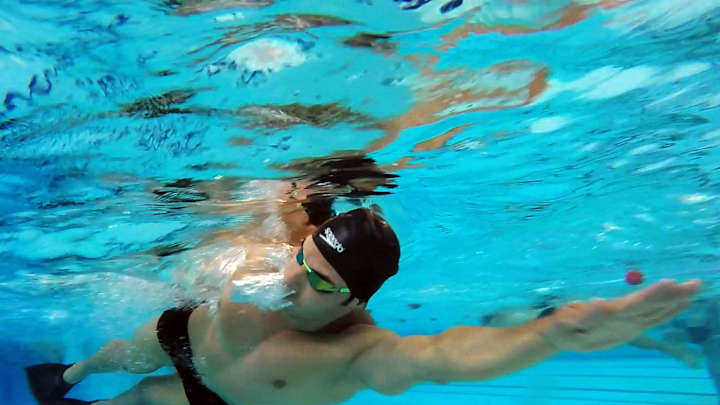In Olympic refugee team, a last chance for a Syrian swimmer

GHENT, Belgium (AP) Rami Anis braved the bombs of Aleppo, then was forced to leave his Syrian home for Turkey five years ago - all the while refusing to give up on an elusive dream of swimming in the Olympics.
He trained at the prestigious Galatasaray sports club in Istanbul, putting in lap after lap after lap, month after month. But soon, frustration set in because he was a refugee. That short window when a good athlete can truly become elite was closing fast. And he knew it.
''I could not swim for the club. I was just training without taking part. All the while, the war was lasting longer. And I was losing my best years as an athlete,'' he said in an interview with the Associated Press.
So last year, at age 24 already, he took a different dive into the water, and crossed on a rubber boat from Turkey into Greece - a stretch of Aegean Sea that has become the tomb of all too many refugees - before setting off a 2,000-mile (3,000 kilometers) trek through the Balkans and onwards to Germany and eventually Belgium.
Now, as part of the first official refugee team at the Games, Anis will be going to Rio - having lost some of his edge and many illusions along the way. Still, he clings to one.
''I wish from my heart that there will be no more refugees and we can go back and participate for our country,'' Anis said.
Not so long ago, he dreamt of being among the best swimmers in the world. He had competed in two world championships and a short-course world cup, finished second at the Asian championships. In short, he was looking to break through at an international level.
After arriving in Europe last fall, he thought he could make money swimming, and provide for his family. All too often though, swimming costs money instead of making it, despite the allure of Olympic gold.
''He didn't want to accept charity,'' said Carine Verbauwen, a former Olympic swimming finalist who later became a coach. The best deal she had for him was that he would not have to pay to swim at her club S&R Rozebroeken, some 30 miles (50 kilometers) west of Brussels. It doesn't quite have the ring of Galatasaray, but at least his Olympic dream was rekindled.
His problems, though, were not solved. Belgian bureaucracy loomed. After Anis was recognized as a refugee he had to look for housing. To get that, he had to prove how much he made. But for social security to give him such a paper, he had to have housing first, Verbauwen said.
Verbauwen said it was a Belgian Catch-22. ''We didn't get the house because we didn't have the paper. We didn't get the paper because we didn't have a house,'' Verbauwen said.
So she looked around among friends and family for a kind spirit and instead of 6 hours of travel for 2 hours of training, he now only lives 25 kilometers (15 miles) from the pool.
Now, it is work on his form that counts, trying to overcome a half-year layoff from top-class training. Verbauwen said that for one month of rest, it takes two to come back. Little wonder Anis will not be challenging for 100-meter butterfly medals in Rio.
''If you don't swim six months then you have lost a lot,'' Verbauwen said. ''It was very, very hard for him to do the training with my swimmers. He was so tired he could not do it anymore,'' she said.
Anis just wants to come out of the water, head held high.
''God willing, I will do a good enough job that satisfied the Olympic Committee and the Syrian people,'' he said.
---
Videojournalist Bishr El-Touni contributed to this report.
---
Follow Raf Casert on Twitter at http://twitter.com/rcasert
